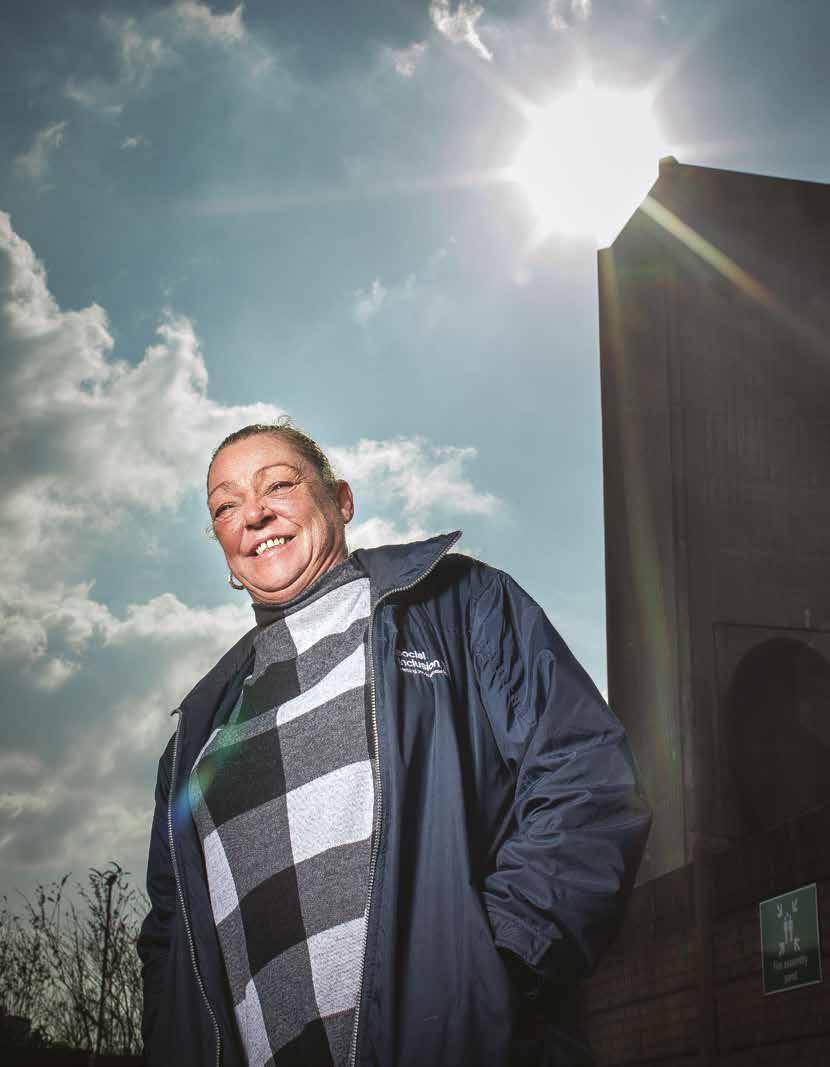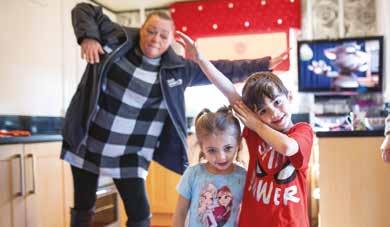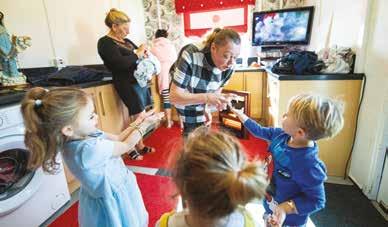
4 minute read
THE TRAVELLERS’ FRIEND

Jayne Stephens (pictured above and below right)
Jackie Rankin visits a traveller site in Liverpool and discovers how one woman is changing things for the better.
Jayne Stephens used to be a security guard. For the last 17 years she’s been supporting residents of a local authority traveller site just outside Liverpool city centre. She’s no pushover, but she’s become trusted and listened to in a community that shuns outsiders.
As part of Mersey Care’s social inclusion team Jayne’s role is to help people from this isolated community to stay well.
It’s a tough ask. Traveller health statistics don’t make for good reading. Life expectancy is almost ten years less for men and almost 12 years for women. UK studies have shown high mortality rates among unborn babies and infants.
We arrive on a bright early spring morning. With 14 plots, all neat and tidy, the site has the feel of a no frills holiday park. Some residents have been on the site since it opened almost 60 years ago.
Jayne is welcomed with open arms by a notoriously private community. As we pass people say hello, ask questions and share their stories. Jayne is clearly in demand.
Older people here don’t read or write and rely on her to explain letters.
part of the wider community – and understanding more and more how to become independent and healthy. Their implicit trust has given her license to raise issues without fear of rebuff.
“Travellers would rather live with their health problems than seek help. It’s partly because they feel judged, but also because health is not a priority for them. Illness is considered a weakness. Words such as cancer are never spoken. A traveller would never admit to having a mental health problem,” says Jayne.
“l could smell rotting flesh. When I finally persuaded her to show me her foot, she had a huge ulcer, part of her foot was literally rotting away. I persuaded her to go to hospital. It turned out she had undiagnosed diabetes and could have lost her foot.”
Others on the site have since followed suit in taking Jayne’s advice. “I draw pictures of what hospital is like to reassure them. I’ll go with them to appointments. It’s about educating people to take responsibility and have control of their lives. I’m sometimes stern but they listen because they know I want the best for them.”
Her gritty determination to educate travellers on health and social issues is supported by her colleagues at Abercromby Health Centre.
She recalls with a wry smile, a session on sexual health with a group of young women. “When I started to explain how their intimate body parts work they all ran out screaming. I was using words they’d never heard and it was too much. But they came back and now they all go for cervical screening and mammograms.”
There are 2,500 travellers on Merseyside. While people on this site do still travel during warmer months it’s as a holiday. They’ve found somewhere they can call home.
Families on the site span three generations and have pride in their plots. Each trailer has a separate toilet and kitchen block. In summer families decorate their outdoor spaces with garden furniture and plants.
We meet Bridget, a mum of seven, who, before coming here, had spent her whole life on the road. She’s grateful to be settled, and with Jane’s encouragement she has integrated well with the local community.
Studies show that formal education has little relevance in a culture that has always relied on practical skills and self employment. Those who do go to school are withdrawn after the primary stage when they are taught to take on adult roles and responsibilities within the family.
Yet with support Bridget’s children have all gone through school and enjoyed academic success. Her face lights up when she talks of their achievements. Her eldest daughter received a Princess Diana award for communities against bullying and racism. Two other daughters have completed vocational qualifications.
Jayne applauds colleagues in the local authority traveller education team, whose dedication helps families here to see the importance of academic knowledge and support them through their children’s school life.
Bridget is an attractive likeable woman. Her trailer is immaculately decorated and squeaky clean. She’s forged relationships that would never have happened in the past. Friends she made at the school gate meet her for coffee. She’s part of their social circle and she loves it.
She’s openly fond of Jayne and appreciative of the help and support she’s had for almost two decades.
I really don’t know what I’d do without her.
“I really don’t know what I’d do without her. She’s always there to explain what letters mean, or to help us organise appointments. I don’t read or write so having Jayne to help us fill in forms is really good. She’s made a big difference round here. I’ll never move on now, I’ll be here for life.”
As we leave the site Jayne smiles and points to a trailer where she says the family often invite her in to share a bowl of soup.
As if to reinforce the importance of her role, a young man spots her and comes over looking concerned. He tells her quietly that his older sister appears very low and he doesn’t know what to do. It’s another breakthrough.
“Don’t worry,” she tells him. “I’ll be back tomorrow”...and she will.












